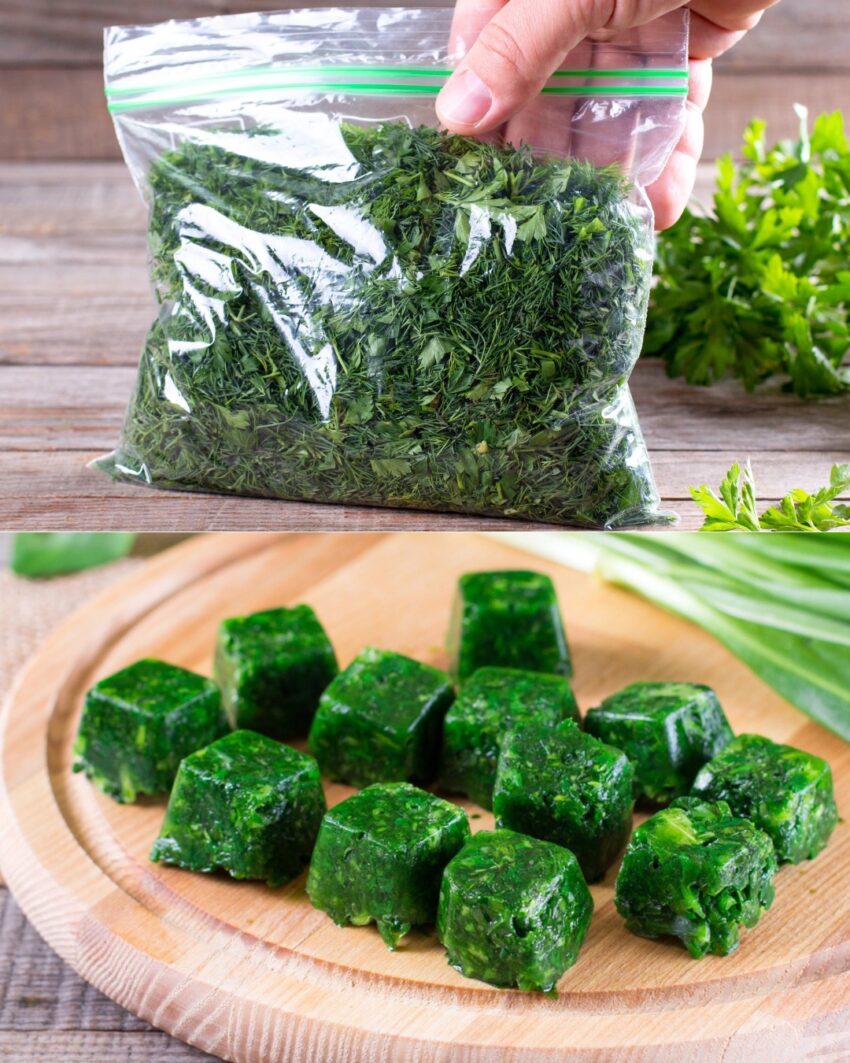Keeping your herbs fresh all year long is a great way to ensure you always have access to fresh flavors, even when they’re out of season. There are several methods to preserve herbs, and each one works best depending on the type of herb and how you plan to use it. Here are a few tried-and-true methods for keeping your herbs fresh all year long:
1. Freezing Herbs
Freezing is one of the easiest and most popular methods for preserving herbs, especially for cooking.
How to Freeze Fresh Herbs:
-
For delicate herbs (like basil, parsley, cilantro, mint):
-
Method 1: Freezing in ice cubes
-
Chop the herbs finely.
-
Place the chopped herbs in ice cube trays.
-
Cover with water or olive oil (oil is great for cooking later).
-
Freeze the cubes and pop them out into a resealable bag for long-term storage. You can use them directly in soups, stews, or sauces.
-
-
Method 2: Freezing without water
-
Wash and chop the herbs.
-
Lay them flat on a baking sheet and freeze them for a few hours.
-
Once frozen, transfer the herbs to a resealable bag or airtight container and store in the freezer.
-
-
-
For sturdier herbs (like rosemary, thyme, sage):
-
These herbs can be frozen whole, or you can strip the leaves off and freeze them in a bag or airtight container. They’re hardy enough to maintain their flavor when frozen and can be used directly from the freezer in cooked dishes.
-
2. Drying Herbs
Drying is another simple method that works well for many types of herbs, and it can be done either in a dehydrator or in a warm, dry space at home.
How to Dry Fresh Herbs:
-
Air Drying:
-
Tie herbs like rosemary, thyme, oregano, or sage into small bundles using string or twine.
-
Hang them upside down in a warm, dry place with good airflow, like a pantry or an unused closet.
-
Let them dry for 1-3 weeks, depending on the humidity and air circulation.
-
Once fully dried, strip the leaves from the stems and store them in airtight containers, away from direct sunlight.
-
-
Oven or Dehydrator:
-
Preheat your oven to the lowest setting (usually around 100°F or 50°C) or use a dehydrator.
-
Place the herbs in a single layer on a baking sheet or dehydrator tray.
-
Dry for 1-4 hours, checking frequently to make sure they don’t burn.
-
Once dried, store the herbs in airtight jars.
-
3. Herb Infused Oil or Vinegar
This method works well for herbs like basil, thyme, rosemary, and garlic. It adds flavor to your oils or vinegars and helps preserve the herbs.
How to Make Herb-Infused Oil or Vinegar:
-
Herb-Infused Oil:
-
Choose an oil like olive oil or sunflower oil.
-
Add fresh herbs (like rosemary, thyme, or basil) into a clean glass bottle or jar.
-
Pour the oil over the herbs, ensuring they are fully submerged.
-
Seal the jar and store it in a cool, dark place for about 2-3 weeks. Shake the jar occasionally.
-
Strain the herbs out before using the oil.
-
-
Herb-Infused Vinegar:
-
Choose a vinegar (white, apple cider, or red wine vinegar works well).
-
Add herbs like thyme, oregano, or basil to the vinegar.
-
Seal the jar and let it sit for 2-3 weeks, shaking it occasionally.
-
Strain the herbs before use, and store in a cool, dark place.
-
4. Herb Pesto (Freezing)
If you love basil, making pesto and freezing it is a great way to keep the fresh flavor of basil year-round. You can freeze pesto in ice cube trays, then store it in a resealable bag.
How to Make and Freeze Pesto:
-
In a food processor, combine fresh basil leaves, garlic, pine nuts, parmesan cheese, and olive oil.
-
Blend until smooth, adding more olive oil if needed.
-
Spoon the pesto into ice cube trays and freeze.
-
Once frozen, transfer the cubes into a resealable bag for easy use throughout the year.
5. Growing Herbs Indoors
For fresh herbs year-round, consider growing them indoors on a sunny windowsill or under grow lights. Herbs like basil, thyme, mint, parsley, and oregano can thrive indoors with a bit of care.
-
Choose herbs that need less sunlight and moderate watering.
-
Consider using pots with drainage to avoid waterlogged soil.
-
Regularly prune and harvest the herbs to keep them growing well.
6. Herb Salt or Sugar
You can mix finely chopped herbs with salt or sugar to preserve their flavors. This method works great for herbs like rosemary, thyme, and lavender.
How to Make Herb Salt or Sugar:
-
Finely chop your fresh herbs.
-
Mix the herbs with salt (or sugar, if you’re making herb sugar) in a 1:2 ratio.
-
Spread the mixture out on a baking sheet to dry, or leave it in a dry place to air-dry.
-
Store in an airtight container and use as a seasoning.
Tips for Keeping Herbs Fresh:
-
Store Fresh Herbs in the Fridge: For short-term storage, keep fresh herbs in the fridge. For herbs like parsley, cilantro, and basil, trim the ends and place them in a jar of water like flowers, covering the tops loosely with a plastic bag.
-
Herb Keeper Containers: You can also use herb keeper containers that are specifically designed to store herbs fresh in the fridge.
By using these preservation methods, you can enjoy your herbs all year long, whether fresh, dried, or frozen. Happy cooking!
